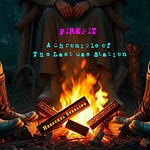There are two parts to this.They have the same audio intro. Sorry for any confusion on that. It’s a fine line between fiction and non-fiction. Maybe two fine lines. Our interpretations of our experiences are pathetic, and that makes reality even harsher. How is fiction both an escape and an exercise? How do we use it to be better?
Hello new followers/ subscribers
, Christopher is a teacher and writer. He seems to like poetry. That’s what my scanner tells me. Did you know I have a built in scanner that picks up subjects and other data from a page of info? Did you know you have one? He seems interesting because maybe he’ll like today’s topic as a writer, because it’s about writing, and setting up some Smell the Inside of Your Nose. Do It Right Now parameters for writing discussions.Another follower is
, they keep track of the music charts and make their own picks. See, look at my scanner go.Kendra! you mysterious Substack app user. Thank you for subscribing.
This became a 2-part thing, and I guess that’s fine.
PART 2. Inability to truly convey experience.
Writing is a weak interpretation of experience.
Scratches on a wall or fingers on a grimy window.
RD Laing. The Politics of Experience
Imagination is vivid. There are no boundaries.
It is solitary and subjective.
Are fictional worlds easier to understand than reality?
Therefore easier to describe?
Seeking to make sense?
Is it easier than doing something about it after figuring out what’s going on?
Why? Obstacles?
What prevents our better worlds from becoming reality?
The creation of characters.
When they begin to write themselves.
They have back stories.
They arrive at a decision for a reason.
Your subconscious mind is working on those characters when you aren’t aware of it.
Think of a fake psychic picking up cues. Age cues, gender cues, different evidences about an individual that puts them in broad statistical categories where it’s easy to guess facts about their grandma.
You know those things about your story’s character.
Once you have that framework, your subconscious mind starts filling in the variables based on some understandings about probabilities that you’ve picked up over time, and the next thing you know, these characters are making decisions, and sometimes it surprises you.
PART 2 will be about the “4 quadrants,” where fiction plays different roles and has different purposes, and what some positive effects that come from fiction are.














Share this post